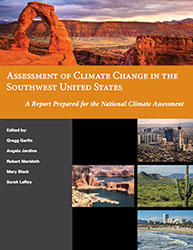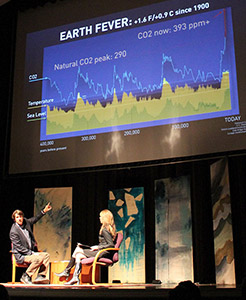 |
||||||||||||||||
 |
||||||||||||||||
Center for Science and Technology Policy Research
|
||||||||||||||||
| Join Our Mailing List |
| Roger Pielke, Jr. to Serve as Next Director of CSTPR | |
 |
Roger Pielke, Jr. will serve as the next Director of the Center for Science and Technology Policy Research, which sits within CIRES at the University of Colorado-Boulder, starting September 1. Professor William (Bill) Travis, who served as Director for the past 5 years, will be ending his term after overseeing strong growth in Center research and personnel. Roger returns to the position, which he previous served in from 2001-2007. He is also the founding director of the Center. The CIRES Policy Center has a staff of 31 including 6 resident faculty members who conduct a wide array of research on issues where science and technology meet policy, with a particular emphasis on environmental issues. The Center also boasts 24 faculty affiliates from CU-Boulder and other universities. The Center hosts the university’s Graduate Certificate in Science and Technology Policy. Read more ... |
| New Book Release: Successful Adaptation to Climate Change | |
 |
This edited volume by Susanne Moser and Maxwell Boykoff makes significant progress toward unpacking the question of successful adaptation, offering both scientifically informed and practice-relevant answers from various sectors and regions of the world. It brings together 18 chapters from leading experts within the field to present careful analyses of different cases and situations, questioning throughout commonly avowed truisms and unspoken assumptions that have pervaded climate adaptation science and practice to date. CSTPR contributors include Kanmani Venkateswaran, Adam Hermans, Alex Lee, Ben Hale, Lisa Dilling, and Aditya Ghosh. Read more ... |
| CSTPR Researchers Contribute to Analysis of Southwest’s Climate Future | |
 |
In an era of increasing climate instability, the southwestern United States faces strained water resources, greater prevalence of tree-killing pests, and potentially significant alterations of agricultural infrastructure. These threats and challenges as well as others are detailed in the new book, Assessment of Climate Change in the Southwest United States. A hotter future is projected for the Southwestern United States—a region stretching from the California coast to the plains of eastern Colorado and New Mexico—and future heat and changes in precipitation will present challenges for managing natural resources, water, infrastructure and threats to human health. Assessment of Climate Change in the Southwest United States, published by Island Press, is a landmark study that addresses these issues. It focuses on current climate conditions in the region, the environment of the past, what is projected to change over the 21st century and how this will impact ecosystems, water resources, agricultural production, energy supply and delivery, transportation and human health. The work includes major contributions from fourteen University of Colorado scientists, twelve of whom are part of CIRES and three from CSTPR. Read more ... |
‘Chasing Ice’ Filmmaker Discusses Gripping Glacial Photography Filmmaker and adventurer James Balog shared his stirring and beautiful glacial photography revealing changes in climate at the University of Colorado Boulder in April. The event, A Conversation with James Balog on the Art of Chasing Ice, was hosted by Earth Vision Trust and CSTPR's Inside the Greenhouse, a multidimensional project that explores the nexus of environmental science and the arts and humanities. Similarly, Balog and his work bridge art and science. Balog is the founder of the Extreme Ice Survey and the subject of the award-winning 2012 documentary film Chasing Ice. He is a Boulder-based photographer, but his work spans the globe documenting changing ecosystems through time-lapse photography stationed at 13 glaciers on four continents. Read more ... |
View more photos |
How outlier views contribute to ongoing illusory, misleading, and counterproductive debates within the public and policy communities
Boykoff, M. T. (2013). Public Enemy No. 1? Understanding Media Representations of Outlier Views on Climate Change. American Behavioral Scientist, March 1.
Exploring how media representations of climate change have changed over time
Boykoff, M. T. and T. Yulsman (2013). Political economy, media, and climate change: Sinews of modern life. Wiley Interdisciplinary Reviews: Climate Change, Published June.
How clarity of language and transparent discussion can aid in stakeholder negotiations
Crow, D. A. and O. Baysha (2013). “Conservation” as a Catalyst for Conflict: Considering Stakeholder Understanding in Policy Making. Review of Policy Research 30 (3) 302-320, Published May.
A brief analysis of some of the challenges of managing carbon in public lands
Dilling, L., R. Birdsey, and Y. Pan (2013). Opportunities and Challenges for Carbon Management on U.S. Public Lands. Land Use and the Carbon Cycle: Science and Applications in Human and Environment Interactions , Ed. Robinson, Brown, French and Reed, 455-476, Cambridge University Press.
Indicating the presence of a dominant, mainstream discourse around climate imagery
O’Neill, S. J., M. Boykoff, S. Niemeyer, and S. A. Day (2013). On the Use of Imagery for Climate Change Engagement. Global Environmental Change, Vol. 23, 413-421.
Governments love to refer to experts—until their advice doesn't suit
Pielke, Jr., R. A. (2013). Dear Expert, Please Cook the Books. Wall Street Journal, Published January 29.
People, especially the sports-viewing public, understand uncertainties just fine
Pielke, Jr., R. A. (2013). How Innovations Such as Goal-Line Technology Make Sport Better. The Guardian, Published June 5.
Broader lessons for how we think about the relationship between academic research and policy making
Pielke, Jr., R. A. (2013), Overcoming the Tyranny of the Stylized Fact. Bridges, Vol. 37, Published May.
Socioeconomic data and tools that can aid climate adaptation strategies
Travis, W. R., and Z. Johnson, 2013. Tracking Socioeconomic Impacts of Drought with Rapid Analytics and Dashboards. Western Water Assessment White Paper.
All articles are available via download from our website or can be requested by email.
To see an archive of past briefings, click here.

